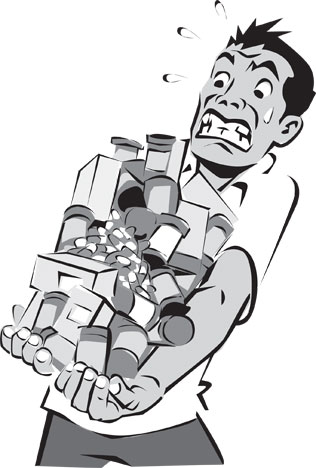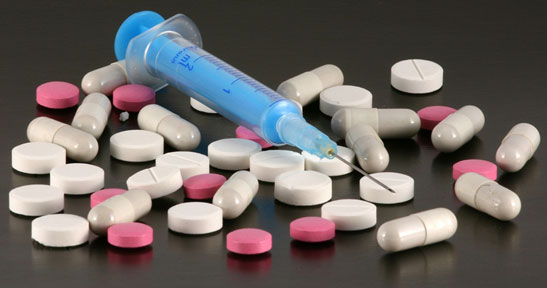Antibiotic abuse is fatal : More Lankans now at risk - study
By Carol Aloysius
 It is an undisputed fact that antibiotics help save lives. Family
doctors and specialists usually prescribe them as an effective treatment
to those common bacterial infections that attack our bodies. While the
outcomes in most cases are successful, the tendency for a growing number
of patients to self medicate themselves with an overload of drugs, in
the hope of a quicker recovery of some infection, without consulting
their doctor, has led to Antimicrobial Resistance (AMR.,) now an
increasing health concern globally, and in Sri Lanka. It is an undisputed fact that antibiotics help save lives. Family
doctors and specialists usually prescribe them as an effective treatment
to those common bacterial infections that attack our bodies. While the
outcomes in most cases are successful, the tendency for a growing number
of patients to self medicate themselves with an overload of drugs, in
the hope of a quicker recovery of some infection, without consulting
their doctor, has led to Antimicrobial Resistance (AMR.,) now an
increasing health concern globally, and in Sri Lanka.
|

Prof Gita Fernando |
Health personnel have warned that inappropriate or misuse of
antibiotics, e.g., using them for minor viral infections, such as, a
common cold or diarrhoea, could have negative outcomes,and could lead to
Antibiotic Resistance which can put the patient’s life at risk and even
have fatal results. The Sunday Observer spoke to Consultant Physician
and Emeritus Professor of Pharmacology, Faculty of Medical Sciences,
University of Sri Jayewardenepura, Prof Gita Fernando, for more insights
into this emerging health issue.
Excerpts…
Q: There has been a growing concern over antibiotic resistance
globally and in Sri Lanka. How big is this problem in 1) the world 2) in
Sri Lanka?
A. Antimicrobial Resistance (AMR) is a serious threat to
public health globally. In Sri Lanka too research carried out shows such
increase in resistance in hospital and community settings. Development
of AMR hinders effective treatment of a variety of infections caused by
microorganisms such as bacteria, viruses, parasites and fungi.
Q: Many people are still unaware of the meaning of antibiotic
resistance. How would you describe it in layman’s language?
A. AMR is resistance of a microorganism to an antimicrobial
drug which was originally effective for treatment of infections caused
by such microorganism. When organisms develop resistance they are able
to withstand attack by antimicrobial drugs such as antibiotics.
Antibiotic resistance refers specifically to resistance to antibiotics
that occurs in common bacteria causing infection-e.g.
Resistance to infections caused by other microbes as well, including
parasites (e.g. malaria), viruses (e.g. HIV), fungi (e.g. Candida, a
yeast)
Q: Why are bacteria becoming resistant to antibiotics today?
Is it a recent phenomenon or something that has developed over the
years?
A. Bacteria develop resistance due to many reasons including:
inappropriate or misuse of antibiotics by health care personnel;
inappropriate use which includes irrational prescribing of antibiotics
by some doctors, inappropriate dispensing practices of pharmacists,
misuse of antibiotics by patients and the general public, such as self
medication.
AMR has developed over the years; resistance to various diseases.
Tuberculosis, malaria, HIV infection are examples of resistance
developing to microbes causing chronic diseases; Multi drug resistant
tuberculosis (MDR- TB) is a long standing problem observed globally as
well as in Sri Lanka.
Resistance to antibiotics given for common acute bacterial infections
including urine infections, pneumonia occurs in all parts of the world.
Q: Who are most at risk, age wise, gender wise and population
wise?
A. AMR can occur in men, women and children of any age. The
elderly and those having immune deficiency are more vulnerable to
development of resistance. Mortality is high if such persons develop
acute infections such as blood stream infections (septicaemia). Death
may even occur.
Q: Do you see this more in urban communities or in rural
populations? Why?
A. It is seen in both urban and rural populations. It may be
more in urban populations as antibiotic use may be higher in urban
settings. Community based research studies have indicated this. In Sri
Lanka, there are only a few community based studies and more such
studies need to be carried out to ascertain and quantify this problem.
Hospital based laboratory research done by Consultant Microbiologists in
different parts of the country has shown increasing patterns of
resistance to common bacteria.
Q: What are the causes? Overuse of drugs?
A. Inappropriate or misuse of antibiotics: giving/using
antibiotics when not needed e.g. for viral infections such as, a common
cold, diarrhoea; using incorrect dosage regimens, using drugs for
inappropriate duration such as patients stopping drugs when symptoms
improve without taking full course prescribed by doctor; self medication
by patients/public.
Q: Can pre-existing diseases like diabetes etc and the use of
different drugs for such diseases also lead to adverse reactions from
antibiotics?
A. In diabetes, resistance to infection may be lowered. Hence,
if such patient develops bacterial infection, antibiotics must be
started early to prevent the worsening of infection. Interactions to
antibiotics due to use of other drugs can occur in any individual, not
only in diabetics or chronic disease.
 Q: Do genes play a role in the degree of risk factors? Q: Do genes play a role in the degree of risk factors?
A. AMR can occur due to resistant genes in bacteria which can
be transmitted from person to person.
Q: What are the early symptoms of antibiotic resistance? How
do you detect them?
A. AMR should be suspected if symptoms of an infection does
not improve despite receiving appropriate course of antibiotics. This
should be confirmed by relevant investigations such as blood tests, X
rays, e.g: in pneumonia chest X ray would show non improvement of
infective changes in the lungs.
Q: Is antibiotic resistance a problem of concern only in a
hospital setting?
A. AMR occurs in both hospital and community settings.
Q: What is the role of antibiotics in controlling upper and
lower respiratory tract infections including community acquired
pneuomonia?
A. Antibiotics are indicated in lower respiratory tract
infections such as community acquired pneumonia, but not in upper
respiratory tract infections (URT) as URT infections are mostly caused
by viruses.
Q: What is the solution to this problem?
A. AMR can be prevented by concerted action by all
stakeholders, including health professionals such as doctors,
pharmacists, nurses, policy makers and the public. Our recommendations
include: prescribers should use antibiotics only when needed;
pharmacists should not prescribe antibiotics as they are ‘prescription
only drugs’, only certified health personnel should prescribe; patients/
public should use full course of antibiotics, avoid self medication, do
not share antibiotics with others or use leftover drugs. Nurses and
policy makers must also enhance infection prevention and control in
hospitals, and promote hand washing to prevent transmission of bacterial
infection. Health professionals should provide information to the pubic
regarding the impact of AMR, its prevention, role of the public in
preventing AMR; policy makers should promote regulatory control to
prevent AMR
Q:What about antibiotic allergies? Can one die of antibiotic
allergies?
A. Yes, severe allergy or anaphylaxis following antibiotic use
can be fatal. So the patient needs to be rushed for treatment to the
nearest hospital.
Q: What is the usual treatment procedure for an antibiotic
overdose?
A. Consult a doctor for advice.
Q: Many children suffering from fever are now being overdosed
by parents with paracetamol and antibiotics when they don’t need them.
At present dengue is on the rise and many parents overdose their
children with paracetamol and antibiotics even when they have a slight
fever or cold, hoping they will recover quickly. What are the adverse
health results that this could have on the young patient?
A. Let me first emphasize this point: Antibiotics are NOT
recommended for dengue fever. On the other hand, overdose of paracetamol
will cause harmful health results in patients suffering from dengue or
other viral fevers. Only the dosage regimen recommended should be given.
Q: Your message on the golden rules of antibiotic use to
parents and the public in general.
A. Antibiotics are not indicated for viral infections and if
misused will lead to antibiotic resistance. Avoid self medication. Wash
hands regularly to prevent transmission of resistant bacteria. |

